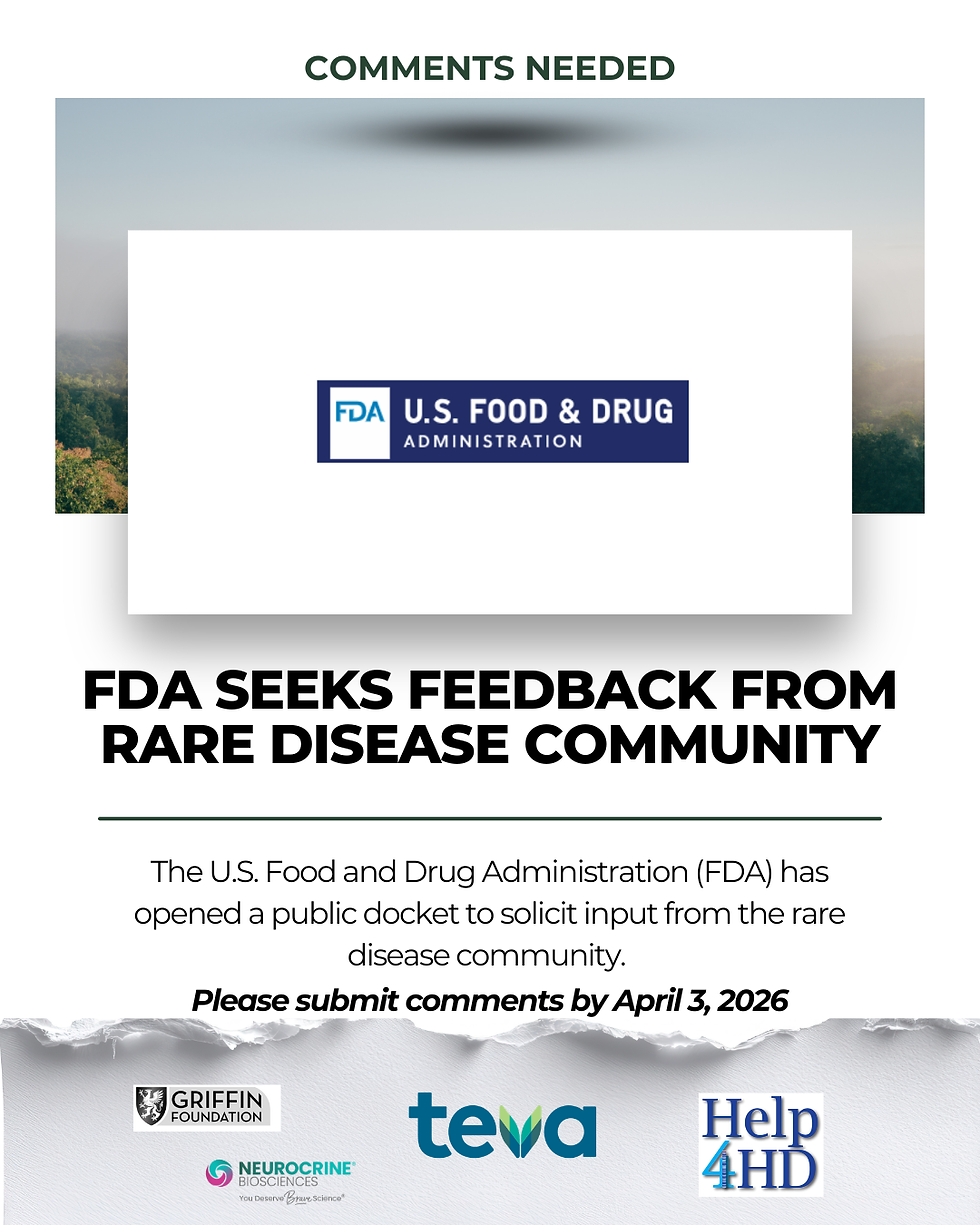Let's Talk About GEN HD1 and GEN HD2
- katrina4384
- Oct 25, 2023
- 3 min read

Can you explain what happened in Gen HD1 and why you have a Gen HD2 study?
What we realized after we looked at generation HD1 was the dose was too high in participants who were getting 120 mg every 8 weeks (2 months), which led to that group having a faster progression. Those participants who were on 120 mg every 16 weeks ( 4 months) progressed the same as those without the drug. Looking at all the data, we found potential benefits in a younger, less advanced HD population. It may be because they were able to tolerate the dose and the medication better. As a result, we are now focusing on this group and using a lower dose to see if we can replicate the benefit we saw in the study. Eventually, our goal is to expand this group, including a wider community of HD participants.
Obviously, this was devastating for the HD community. But since then, Roche/Genentech has gone through and analyzed all the data. What do we know now? (i.e., Any lasting effects? Subgroups that benefit? Nfl?)
The reason we are moving into Generation HD2 is to test the signal that we saw from the Generation HD1 study, as we discussed before. Analysis of the data suggests that the dose was too high in GENERATION HD1, particularly when given every 8 weeks. It is possible that the younger, less severe burden participants did better because they were able to tolerate the higher dose.
As a result, In the Generation HD2 study, we are now lowering the total dose (60mg & 100mg) and dosing every 16 weeks ( 4 months) and moving into an earlier population, prodromal and early manifest.
I do want to talk a bit about Nfl. Nfl stands for neurofilament light chain and is a biomarker, a marker of neurodegeneration. Nfl in people with Huntington’s disease increases over time as the disease progresses.
Analysis of the GENERATION HD1 data suggests that we can avoid NfL increases and potentially even see NfL lowering in the doses we are using in GENERATION HD2.
What are the exclusion/inclusion criteria for Generation HD2?
Key Inclusion Criteria
Signed study companion consent form. A study companion is required for all participants.
HD gene expansion mutation carrier status. CAP score of 400-500, inclusive, where CAP is calculated as follows:
Age x (CAG repeat length -33.66)
Prodromal HD, defined as DCL 2 to 3, Total Motor Score (TMS) >6, Independence Scale (IS) = 100, or early manifest HD, defined as DCL 4, TMS > 6, 100 >IS>/= 70, and TFC >/=8
ages 25-50, prodromal and early manifest; if you are further interested, please talk to your HD physician.
Key Exclusion Criteria
Current or previous use of an ASO (including small interfering RNA) or any HTT lowering therapy (including tominersen)
Anti-platelet or anticoagulant therapy within 14 days prior to screening or anticipated use during the study, including, but not limited to, aspirin (unless </= 81 mg/day), clopidogrel, dipyridamole, warfarin, dabigatran, rivaroxaban, apixaban, and heparin
History of gene therapy, cell transplantation, or brain surgery
Hydrocephalus
Pregnancy or breastfeeding, or intention of becoming pregnant during the study or within 5 months after the final dose of study drug
History of attempted suicide or suicidal ideation with plan (i.e., active suicidal ideation) that required hospital visit and/or change in level of care within 12 months prior to screening.
Where are the trial sites?
Dr. Bennett Myers - Dent Neurological Institute - Amherst, NY (716) 250-2000
Dr. Rajeev Kumar - CenExcel Rocky Mountain Clinical Research LLC - Englewood, CO (720) 776-0092
Dr. Daniel Claassen - Vanderbilt Univ Medical Center - Nashville, TN (615) 875-7403
Dr. Jason Aldred - Inland Northwest Research - Spokane, WA (509) 960-2818
Dr. Victor Sung - UAB MEDICINE - Birmingham, AL (205) 801-8986
Dr. Nikolaus McFarland - University of Florida - Gainesville, FL (352) 294-5400
Dr. Samuel Frank - Beth Israel Deaconess Medical Center - Boston, MA (617) 667-0519
Dr. Danny Bega - Northwestern University - Chicago, IL (312) 695-7950
Dr. Jee Bang - Johns Hopkins University School of Medicine - Baltimore, MD (410) 955-9442
Dr. Jody Corey-Bloom - University of California San Diego - La Jolla, CA (858) 246-1288
Dr. Stephen Aradi - University of South Florida - Tampa, FL (813) 396-9478
Dr. Fahd Amjad - Georgetown University Research Division, Psychiatry - Washington, DC (202)-444-8525
Dr. Annie Killoran - University of Iowa Hospitals and Clinics - Iowa City, IA (319) 356-2572
Dr. Alexandra Duffy - University of California Davis Medical System - Sacramento, CA - (916) 734-3588
Dr. Valerie Suski - University of Pittsburgh - Pittsburgh, PA (412) 692-4600
Dr. Pinky Agarwal - Evergreen Health Care Center - Kirkland, WA (425) 899-3123
Dr Nicki Niemann - Barrow Neurological Institute - Phoenix, AZ (855) 752-8177
Can people participate in Generation HD2 if they previously were a part of Generation HD1?
Participants who received placebo and who meet the inclusion criteria of GENERATION HD2 may potentially enroll.





Great info for the community!